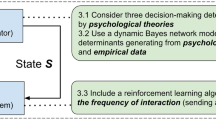Abstract
Personalization of support in health and wellbeing settings is challenging. While personalization has shown to be highly beneficial to maximize the success of interventions, often only very limited experiences are available to personalize support strategies. Because of its focus on finding suitable actions/interventions that lead to long term rewards, reinforcement learning is very suitable for personalization but requires a substantial learning period. To overcome this so-called cold start problem, we propose a novel approach called narrowing reinforcement learning. The approach exploits experiences of the nearest neighbors around a user to generate a suitable policy, expressing which action to perform in what state. Using a narrowing function, the size of the neighborhood is reduced as more experiences are collected, allowing for the most personalized experience that is possible given the amount of collected experiences. An evaluation of the approach in a realistic simulator shows that it significantly outperforms the current state-of-the-art approaches for personalization in health and wellbeing using reinforcement learning.
Access this chapter
Tax calculation will be finalised at checkout
Purchases are for personal use only
Similar content being viewed by others
Notes
- 1.
In our experiments, an intervention is just a message that would send to the agent and invite him to workout in that day. The agent can accept or reject it.
References
Berndt, D.J., Clifford, J.: Using dynamic time war** to find patterns in time series. In: KDD Workshop, Seattle, WA, vol. 10, pp. 359–370 (1994)
Evans, K.: Heres to your (mobile) health: the number of iOS mobile health apps more than doubles. https://www.mobilestrategies360.com/2015/09/21/number-ios-mobile-health-apps-more-doubles. Accessed 30 Sept 2010
Gonul, S., Namli, T., Baskaya, M., Sinaci, A.A., Cosar, A., Toroslu, I.H.: Optimization of just-in-time adaptive interventions using reinforcement learning. In: Mouhoub, M., Sadaoui, S., Ait Mohamed, O., Ali, M. (eds.) IEA/AIE 2018. LNCS (LNAI), vol. 10868, pp. 334–341. Springer, Cham (2018). https://doi.org/10.1007/978-3-319-92058-0_32
El Hassouni, A., Hoogendoorn, M., van Otterlo, M., Barbaro, E.: Personalization of health interventions using cluster-based reinforcement learning. CoRR abs/1804.03592 (2018). http://arxiv.org/abs/1804.03592
Hofferth, S., Flood, S., Sobek, M.: American time use survey data extract builder: version 2.5 [dataset]. University of Maryland and Minneapolis, College Park, MD, University of Minnesota, MN, doi 10, D060 (2015)
Hoogendoorn, M., Funk, B.: Machine Learning for the Quantified Self: On the Art of Learning from Sensory Data. Springer, Cham (2017). https://doi.org/10.1007/978-3-319-66308-1
Sutton, R.S., Barto, A.G.: Reinforcement Learning: An Introduction, vol. 1. MIT Press, Cambridge (2018)
Watkins, C.J., Dayan, P.: Q-learning. Mach. Learn. 8(3–4), 279–292 (1992)
Wiering, M., Van Otterlo, M.: Reinforcement learning. Adapt. Learn. Optim. 12, 51 (2012)
Wilcoxon, F., Wilcox, R.A.: Some rapid approximate statistical procedures. Lederle Laboratories (1964)
Zhu, F., Guo, J., Xu, Z., Liao, P., Huang, J.: Group-driven reinforcement learning for personalized mHealth intervention. ar**v preprint ar**v:1708.04001 (2017)
Author information
Authors and Affiliations
Corresponding author
Editor information
Editors and Affiliations
Rights and permissions
Copyright information
© 2018 Springer Nature Switzerland AG
About this paper
Cite this paper
Tabatabaei, S.A., Hoogendoorn, M., van Halteren, A. (2018). Narrowing Reinforcement Learning: Overcoming the Cold Start Problem for Personalized Health Interventions. In: Miller, T., Oren, N., Sakurai, Y., Noda, I., Savarimuthu, B.T.R., Cao Son, T. (eds) PRIMA 2018: Principles and Practice of Multi-Agent Systems. PRIMA 2018. Lecture Notes in Computer Science(), vol 11224. Springer, Cham. https://doi.org/10.1007/978-3-030-03098-8_19
Download citation
DOI: https://doi.org/10.1007/978-3-030-03098-8_19
Published:
Publisher Name: Springer, Cham
Print ISBN: 978-3-030-03097-1
Online ISBN: 978-3-030-03098-8
eBook Packages: Computer ScienceComputer Science (R0)




